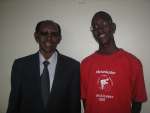Mukayiranga Verena & Mugisha Gabriel & Sharangabo Jean de Dieu
Mukayiranga Verena is speaking with two of her adopted sons, Mugisha Gabriel and Sharangabo Jean de Dieu. She tells stories of her struggles with discrimination between the different ethnicities and how there was nothing but love between all Rwandese people before the colonists arrived. Verena shares how she lived in paralyzing fear during the war saying “I could not sleep well; I would think that people would come to kill us.” Despite being traumatized by her experiences she overcame her fear and shares her story with her sons.
Kaberuka Anatole & Mulima Ngautabana Yves
It is well known in Rwanda that ethnic tribes coexisted peacefully before the genocide. Kaberuka Anatole explains to his grandson Mulima Nyautabana Yves about how the colonial regime worked to turn tribes against one another, cultivating hatred and jealousy in order to maintain control and exploit Rwanda. In a history tale that begins before Belgian rule, Kaberuka Anatole shows how the colonial regime treated the country like playing a game of cards.
Uwayezu Dieu Domme & Gota Issa
Gota Issa asks his father, Uwayezu Dieu Domme, to explain the difference between how Rwandese lived in the past and how they live today. Uwayezu Dieu Domme takes this opportunity to describe how life was in Rwanda before ethnicities were brought by the white people. This was a time when Rwandese respected and helped each other, regardless of their background. Uwayezu Dieu Domme hopes that the Rwandese today can learn from the culture of their ancestors and start to respect each other once again. He notes that “the most important battle is to know history.”
Ngunga Deogratius & Mugabo Richard
Mugabo Richard asks his elder about colonialism: How were they able to take control of Rwanda? What types of things did his father witness under colonialism? Why did this they decide to divide Rwandan society? Ngunga Deogratius describes the injustices he saw like poisoning of the water, burning of houses, needless slaughter of cattle, etc. Ngunga Deogratius describes the misunderstandings between the colonial settlers and indigenous people on issues like nutrition, religion, and ethnic divisions. He also tells his son of his time in a dangerous territory.
Gahongaire Emelda & Manirakiza Jean de Dieu
Gahongaire Emelda decided to become a pastor after witnessing the love for God that her grandfather had. After the genocide, she decided to serve God by helping orphans, and she adopted Manirakiza Jean de Dieu, who she considers to be her own son. Manirakiza Jean de Dieu has many important questions about the causes of the genocide, and Gahongaire Emelda patiently answers him and gives him advice. She tells him that the most important thing is to love God and fight against anything that could lead to genocide again.







